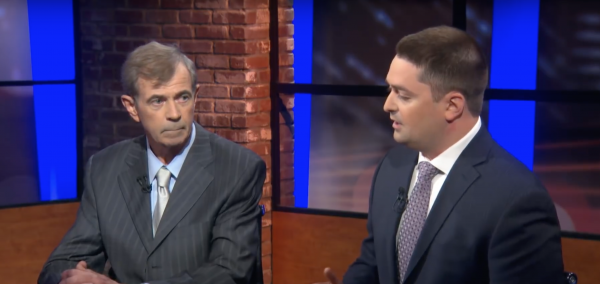August 15, 2018

Galvin, left, and Zakim faced off at the WGBH debate
There was no love lost between Secretary of State William Galvin and Boston City Councilor Josh Zakim who squared off in a tense half-hour television debate on Tuesday evening, trading verbal punches and innuendo as the two battle in a Democratic turf war for an office Galvin has held for over two decades.
Galvin, who agreed to the debate on WGBH's "Greater Boston" only a day before the taping, criticized his younger opponent for lacking experience and distorting his record. Zakim, meanwhile, tried to paint the long-time incumbent as an obstacle to reform, including same-day voter registration, which Galvin says he supports.
The fast-moving dialogue moderated by host Jim Braude touched on everything from Galvin's choice to schedule this year's primary on Sept. 4, the day after Labor Day, to Zakim's own record of voting -- or not voting -- in primaries.
Galvin even suggested that Zakim has been concealing a "special committee created for only his benefit to take in corporate funds" to support Zakim's campaign. Galvin made the assertion as a reason why Zakim declined his offer to sign a "People's Pledge" to limit outside spending in the race.
"Every major progressive change that has occurred in Massachusetts election laws has come about because of me," Galvin declared early in the debate, taking credit for pushing automatic voter registration through the Legislature in the closing days of the session in July, among other things.
It was a response to Zakim's contention that the secretary should bear responsibility for the fact that Massachusetts will not have early voting before this year's primary, and that Massachusetts is not one of the 17 states with same-day voter registration. There will be early voting before the general election.
"Bill is a recent convert to a lot of positions I've taken and am running on in this campaign," Zakim said.
Galvin said Zakim and Braude should ask Sen. Jamie Eldridge, who would vouch for his long-standing support for same-day voter registration and his work with the senator in past years to try to identify funding for the reform.
"I've never seen you at a hearing ever on same-day or anything else," Galvin told Zakim.
When Zakim responded by telling Galvin he has never seen the secretary at a City Council hearing on voting issues, Galvin retorted, "Because the City Council doesn't have anything to do with making law. I know it's a fantasy down there that you do, but you don't."
Zakim suggested that Galvin intentionally set the primary date for Sept. 4 to suppress voter turnout, while Galvin maintained it was the best choice in a set of less-than-ideal options to avoid conflicts with Jewish holidays in September and to ensure the state complies with requirements that ballots are available to troops serving overseas.
"It's certainly not a move intended to increase turnout," said Zakim, who recommended experimenting with weekend voting later in the month. Galvin said he doesn't think Saturday voting would boost turnout.
Zakim also tried to ding Galvin over a News Service report on Tuesday that a Cambridge man arrested in April by federal authorities for playing a role in a "pump and dump" penny stock scam involving a Medford-based biotech company spent at least nine years working for Galvin.
The defendant, M. Jay Herod, was a information technology consultant contracted through an outside firm that did work with registries of deeds around the state. Galvin until Tuesday had not previously acknowledged Herod's work for the state, but said he was immediately fired when Galvin found out about the stock scheme on the day Herod was arrested.
"This was happening, literally, under your nose," Zakim said, noting that the secretary's office, in addition to election oversight, is in charge of securities regulation and enforcement.
Galvin described Herod as a "contractor" who had nothing to do with either his Securities Division or his Elections Division and had no access to the central voter database.
Galvin also came ready to try to score some points against his opponent, criticizing Zakim for not voting in Massachusetts in the 2006 Democratic primary for governor won by Deval Patrick or the 2004 presidential primary won by then-U.S. Sen. John Kerry.
"You criticize me for lowering participation and you don't vote," Galvin said.
Zakim acknowledged not voting in 2004 when he said he was a college student at the University of Pennsylvania, but did not address the 2006 state primary, which occurred the September he began law school at Northeastern University.
Galvin also challenged Zakim repeatedly to accept a pledge to reject outside money in their race, which Zakim refused to do because he said the pledge was only meant to distract voters from Galvin's history of taking campaign donations from employees and people with business in front of the secretary.
"The real issue is you've already set up the entity to do it," Galvin told Zakim, without elaborating. Zakim did not directly address the allegation, and his campaign later told the News Service that it was unaware of what Galvin was referring to and said Zakim had not set up a super PAC to support his campaign.
The one issue the two candidates did agree on? The Electoral College.
Both Galvin and Zakim said they would like to see the Electoral College abolished, and support the state's participation in a compact that would commit the state's 11 electoral votes to the winner of the national popular vote as soon as enough states join the compact to control the outcome of a president election.
Both also said they oppose a lawsuit brought by former Gov. William Weld and Harvard Law School Professor Lawrence Lessig against Massachusetts and three other states challenging the winner-take-all allocation of Electoral College votes.
Topics:


